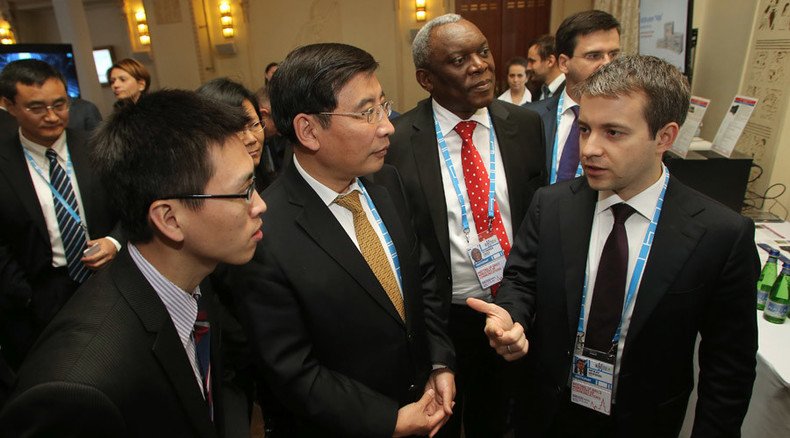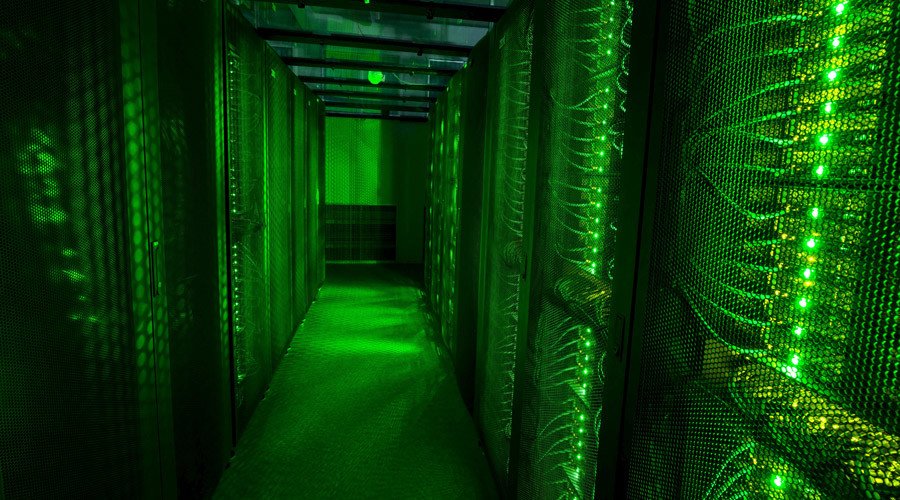US monopoly on internet may end in 3 to 7 years – Russian communications minister

It won’t be easy, but a joint effort by BRICS nations may see the US monopoly on the internet coming to an end in the next 3 to 7 years, Nikolay Nikiforov, Russia’s communications minister, told RT after the block’s first ministerial meeting in Moscow.
RT:This was the first meeting of its kind. What key issues were you able to tackle this time?
Nikolay Nikiforov: I fully agree. This is quite unique just because the BRICS platform was used by many, many industries – agriculture, health care, finance ministers; they had their own meeting – but, you know, never ever ICT ministers – those who are responsible for communications, for implementing IT, well, managing internet infrastructure – they never ever met. So this is a historic event. It happened for the first time. That was the proposal of the Russian Federation and was supported by the heads of state, our leaders at the summit in Ufa.
So now we had our meeting. First, we had some kind of an IT forum: ministers from BRICS countries, they came not alone, not only with formal delegations. They also brought with them their leading IT companies. The Russian Federation also showed those solutions – those outstanding, outperforming companies that we have here in Russia. We showed Yandex; we showed our Russian microprocessors – many, many other solutions that we do have here today.
But for every small company, every national leader, it’s still impossible to fight for the global market. And the key issue here is monopolization. And we really require some kind of diversification of the IT solutions that we have today. That’s why we need joint efforts by all BRICS nations, because we represent just about half of the population of the planet and we realize that every citizen will be finally connected online with this or that smartphone or tablet. That’s why it’s potentially half of the world global market of these devices and software ecosystem.
BRICS countries should challenge American IT monopoly – Russian minister https://t.co/N1188xQ3v3pic.twitter.com/0ZP8vGCXJM
— RT (@RT_com) 23 октября 2015And we really want it to be balanced, not to depend on one country or several companies. We really want fair competition and, actually, this is probably the major discussion topic on our agenda. But also we’re concerned, for example, with such issues as the management, the governance of the critical internet infrastructure. It’s also, by the way, an issue of monopolization. As you know, today it’s still under a particular government contract between the government of the US and a legal entity also located in the US, which is called ICANN. It’s the internet corporation which is assigning domain names, internet addresses. But, still, it’s a legal entity under the US law.
That’s why the whole global society is really widely discussing some kind of a transition time frame for it to be transferred to some kind of a real multistate holder approach, where it’ll be managed by all interested parties, including national governments, because they’re finally responsible for security and for national law on their territories, as well as different NGOs, academic organizations. So, we really are expecting this process.
Unfortunately, it was promised that it would be finished by the end of September this year, but it didn’t happen, and, still, the critical infrastructure is just under the management of one country in the world and one particular legal entity in this country. So, this was also a kind of a topic.

RT:How does internet monopoly or IT monopoly affect the security of BRICS countries?
NN: Well, I think that, probably, Snowden’s disclosures showed exactly the harmfulness of the monopoly, because it would not be possible if the world IT market should be structured in a more balanced way – where no country and no particular company controls like 90-95% percent of this or that market – it would be impossible just to come to several companies and to force them, from the position of this or that security agency, to actually provide absolutely illegal access to hundreds of millions records of private data of users globally. This is the harmful factor of monopolization.
NSA may have had ability to bypass ‘unbreakable’ encryption for years http://t.co/qzL4nrG4ZHpic.twitter.com/kcM23qjcOV
— RT (@RT_com) October 17, 2015The other harmful factor is the economic issue. When you have monopolization, the monopolist could dictate you a certain price level. And we realize that the ICT market is about… well, it’s not about millions – it’s about already billions of dollars. Each country in the world is actually sending out billions of dollars outside its national economies as license fees for this or that payment for these key technologies. And we really want it to be balanced. We want every citizen; we want every company to have a fair approach to different alternative solutions.
We don’t want to prohibit anything. We don’t want to use any sanctions approach that is becoming, unfortunately, so popular in the Western world. We’re just talking about supporting our national developers, taking the strongest companies that we have in our national economies. I think, well in India and Russia, we do have some strong competence in software. In China, we really see how Chinese companies are, you know, reshaping the whole world. The same strength we see in Brazil, in South Africa. By the way, we don’t actually limit our efforts just to the BRICS ecosystem. We are ready to [work] with any countries in the world, but we should join our efforts, finally, to create a more balanced solution. And I believe it could be possible to be done in just maybe three to five years from now.
#Snowden leaks reveal harmfulness of US monopoly on internet – Russian minister https://t.co/B3eathU2XPpic.twitter.com/rEOhEwJ9Jk
— RT America (@RT_America) October 23, 2015RT:How does geopolitics influence the World Wide Web these days? And how does it affect the decision by BRICS nations?
NN: Definitely, everybody sees this or that sanctions decision. Sanctions mean, also, blocking sanctions to this or that technology that companies or individuals were using for many years. We had it in many cases. We had the example recently in Iran. We’ve just got our own Russian example with Crimea when, well, it’s kind of almost impossible to use this or that popular internet service there from a legal framework. We think it’s not a kind of a fair approach when our customers don’t have adequate alternative solutions. And we are ready to provide it.
Yandex and Microsoft team up against Google http://t.co/Yp5MITmTtBpic.twitter.com/qTrUoY9Jz1
— RT (@RT_com) October 18, 2015It could be done in the area of mobile operating systems. It should be done in the field of search engines, and we see the unfair competition in these areas. It should be done in the area of microprocessors, which is also a very much controlled and monopolized market, and so on and so forth. So, for every market niche there could be a separate action plan for BRICS countries to support this or that company, including some kind of strategic investors, including some kind of special regulation from the national governments, and so on and so forth, finally to create a balanced ecosystem. We believe not only BRICS countries would win. Actually, it’ll be the whole of mankind, the whole IT ecosystem of the global world will finally benefit from that.
RT:Have the ministers discussed the potential of the new BRICS bank in the development of the global network?
NN: Exactly, the BRICS Bank was mentioned a couple of times. Probably, it was first mentioned when we’ve been discussing the direct undersea cable connection between BRICS countries. Why [do] we need that? The answer is also simple. We just need stable and reliable basic internet infrastructure that’s not dependent on this or that existing internet hub, and somehow could be influenced by this or that geopolitical decision. So, probably this undersea cable with a direct and high-speed connection between BRICS nations could be one of the first infrastructure projects funded by the BRICS Bank. We definitely need to prepare all the business case descriptions, all the calculations. We need to bring in private business here as well. But, probably, yes – that’s the type of the project that could be invested [in].
GCHQ given green light to spy on MPs, court rules http://t.co/6KEt1Vspzjpic.twitter.com/xlvC7IJQyf
— RT UK (@RTUKnews) October 14, 2015We also think that we have to invest a lot in our joint efforts to diversify, de-monopolize the existing microelectronics because, still, even though China and India are trying to fight back the market for these tablets and smartphones, still, they highly depend on the actual microchips – the very, very fundamental bricks of which these devices are made. And it’s really some kind of state-of-the-art technology, and we really need to have a joint effort of our engineers, as well special microchip fabs, to actually produce that. It’s also a kind of intensively invested industry that could probably require BRICS Bank’s support.
RT:How far away are we from actually balancing the global IT market?
NN: Our dream is about, you know, that every market niche is not controlled by more than 50 percent by this or that country or company. Today unfortunately, usually, it’s about 90-95 percent. Let’s be realistic. Even though that software sounds simple, these are really state-of-the-art technology solutions. We require thousands of engineers. We require the joint efforts of governments in order to do that. But if we work hard, I believe that in three, maybe five, maybe seven years from now, this market structure could be reshaped. And the major power here is, actually, our own internal market. BRICS is probably the largest politically consolidated market. If we do our best, take joint decisions; if we have a special work group or task force of our experts working together, as well as from ministries and from industries as well – that could be a solution to doing that. We see that our IT companies are willing to do that. They do have this ambition, which is very good. And we have this human capital and technology potential to do that. But they could do nothing without this government support because of unfair competition in this area. And we’ll do our best to provide them with some kind of a foundation in order to succeed.












